富兰克林的中英文简介及其名言
富兰克林简介富兰克林简介富兰克林经典语录

富兰克林简介-富兰克林简介富兰克林经典语录富兰克林简介:本杰明·富兰克林别名班哲明·富兰克林. 出生于美国麻省波士顿,是美国著名政治家、科学家,同时亦是出版商、印刷商、记者、作家、慈善家;更是杰出的外交家及发明家。
他是美国革命时重要的领导人之一,参与了多项重要文件的草拟,并曾出任美国驻法国大使,成功取得法国支持美国独立。
本杰明·富兰克林曾经进行多项关于电的实验,并且发明了避雷针。
他还发明了双焦点眼镜,蛙鞋等等。
本杰明·富兰克林是共济会的成员,被选为英国皇家学会院士。
他亦是美国首位邮政局长。
富兰克林不仅是一位优秀的科学家,而且还是一位杰出的社会活动家。
他一生用了不少时间去从事社会活动。
富兰克林特别重视教育,他兴办图书馆、组织和创立多个协会都是为了提高各阶层人的文化素质。
正当他在科学研究上不断取得新成果的时候,由于英国殖民者的残暴统治,北美殖民地的民族解放运动日益高涨。
富兰克林简介从1757到1775年他几次作为北美殖民地代表到英国谈判。
独立战争爆发后,他参加了第二届大陆会议和《独立宣言》的起草工作。
1776年,七十岁的富兰克林出使法国,赢得了法国和欧洲人民对北美独立战争的支援。
1787年,他积极参加了制定美国宪法的工作,并组织了反对奴役黑人的运动。
他是一位优秀的政治家,是美国独立战争的老战士。
他参加起草了《独立宣言》和美国宪法,积极主张废除奴隶制度,深受美国人民的崇敬。
富兰克林简介他是美国第一位驻外大使,所以在世界上也享有较高的声誉。
1753年,富兰克林获得了哈佛和耶鲁大学的名誉学位。
于1756年,本杰明·富兰克林获得威廉玛丽学院的荣誉学位。
本杰明·富兰克林是18世纪美国的实业家、科学家、社会活动家、思想家、文学家和外交家。
他是美国历史上第一位享有国际声誉的科学家和发明家。
本杰明富兰克林的一句话 you teach me
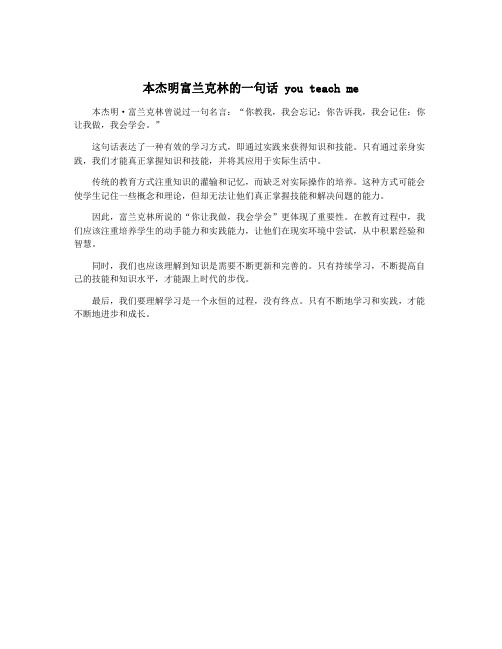
本杰明富兰克林的一句话 you teach me
本杰明·富兰克林曾说过一句名言:“你教我,我会忘记;你告诉我,我会记住;你让我做,我会学会。
”
这句话表达了一种有效的学习方式,即通过实践来获得知识和技能。
只有通过亲身实践,我们才能真正掌握知识和技能,并将其应用于实际生活中。
传统的教育方式注重知识的灌输和记忆,而缺乏对实际操作的培养。
这种方式可能会使学生记住一些概念和理论,但却无法让他们真正掌握技能和解决问题的能力。
因此,富兰克林所说的“你让我做,我会学会”更体现了重要性。
在教育过程中,我们应该注重培养学生的动手能力和实践能力,让他们在现实环境中尝试,从中积累经验和智慧。
同时,我们也应该理解到知识是需要不断更新和完善的。
只有持续学习,不断提高自己的技能和知识水平,才能跟上时代的步伐。
最后,我们要理解学习是一个永恒的过程,没有终点。
只有不断地学习和实践,才能不断地进步和成长。
富兰克林名言合集及背景资料

富兰克林名言合集及背景资料富兰克林(Benjamin Franklin,1706~1790)美国科学家、物理学家、发明家、政治家、社会活动家。
本杰明·富兰克林,资本主义精神最完美的代表,人类道德与理性的最佳诠释者,一个令人难以置信的通才。
他的多重身份对此做了最好的诠释:作为政治家,他是美国建国的创始者、美国独立运动的领导者、民主精神缔造者、《独立宣言》的起草者,富兰克林是一位真正的名垂千古的伟人。
作为一名作家、发明家、幽默大师,他的一生,为人们树立了一个献身于公益事业的榜样。
1.我出生贫寒居然能够挣扎到生活还算富裕,在社会上也有一点小名气一声就得到相当幸福的生活,我的后羿或许会喜欢知道我用什么好的办法,再加上天的恩赐才能够这样的成功,有时候会发现他们自己曾经很合适,因此用于摹仿。
--《富兰克林传》2.当我回想到自己有过如此幸运的生活时,有时常常会说藏如果上天给我机会让我自己选择,我绝不反对把从前的生活从头再过一遍,不过只想能够像一个作者一样,在一本书出第二版时有机会改正错误。
--《富兰克林传》3.我们不能希望重新为人,所以似乎只有不得已而求其次,一边回忆那时的生活,一边把自己的回忆所得写下,使他能够尽可能的经久长存。
--《富兰克林传》4.小富兰克林带小伙伴偷砖建钓鱼台,向父亲辩解说这是有益的事,遭到父亲的谴责:不诚实的事是不会有益的。
--《富兰克林传》5.苏格拉底用对话法进行辩论的实例,吸引了他,从此,富兰克林放弃了自己生硬反驳和武断立论的辩论方式,而效法苏格拉底,用一个谦逊的、对事物抱有怀疑的人的口吻发问。
他发现这种方法常常使自己的对手,即令是“很有学问的人”也不得不让步,直到陷入窘境,而使自己和自己的论点获得往往是不应得的胜利。
但几年以后,富兰克林又逐渐放弃了这种辩论术,而只保留了用谦虚的语句表达个人意见的习惯。
--《富兰克林传》6.每当提出什么可能引起争论的意见时,富兰克林从不用“一定”“无疑”等肯定语气的字眼,而宁愿用“我猜想”“我料想”、为了什么理由,“在我看来这件事好像是”等等。
富兰克林的名言大全中英文
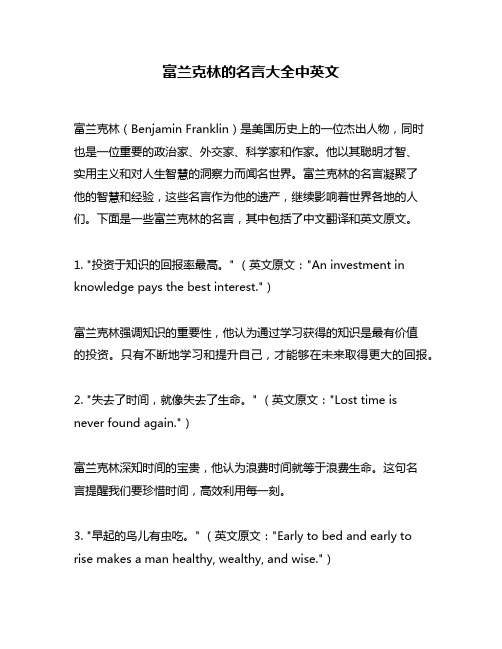
富兰克林的名言大全中英文富兰克林(Benjamin Franklin)是美国历史上的一位杰出人物,同时也是一位重要的政治家、外交家、科学家和作家。
他以其聪明才智、实用主义和对人生智慧的洞察力而闻名世界。
富兰克林的名言凝聚了他的智慧和经验,这些名言作为他的遗产,继续影响着世界各地的人们。
下面是一些富兰克林的名言,其中包括了中文翻译和英文原文。
1. "投资于知识的回报率最高。
" (英文原文:"An investment in knowledge pays the best interest.")富兰克林强调知识的重要性,他认为通过学习获得的知识是最有价值的投资。
只有不断地学习和提升自己,才能够在未来取得更大的回报。
2. "失去了时间,就像失去了生命。
" (英文原文:"Lost time is never found again.")富兰克林深知时间的宝贵,他认为浪费时间就等于浪费生命。
这句名言提醒我们要珍惜时间,高效利用每一刻。
3. "早起的鸟儿有虫吃。
" (英文原文:"Early to bed and early to rise makes a man healthy, wealthy, and wise.")这是富兰克林最著名的名言之一。
他认为早睡早起可以使人保持健康、富裕和聪明。
这句名言强调了健康生活习惯和工作的重要性。
4. "三思而后行。
" (英文原文:"Three may keep a secret if two of them are dead.")这句名言着重强调了谨慎思考和行动之前冷静思考的重要性。
它提醒我们在做决定之前要谨慎权衡利弊,并要特别小心谨慎的保守秘密。
5. "不要拖延明天可以完成的工作。
" (英文原文:"Don't put off until tomorrow what you can do today.")这句名言敦促我们不要拖延任务,需要立即行动。
本杰明·富兰克林语录
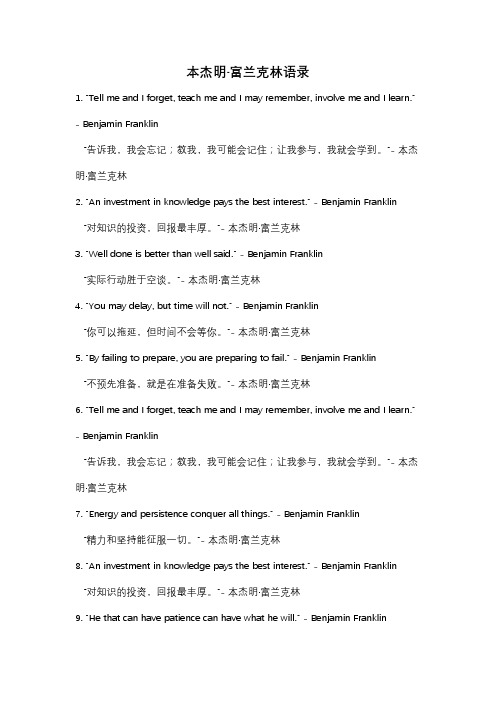
本杰明·富兰克林语录1. "Tell me and I forget, teach me and I may remember, involve me and I learn." - Benjamin Franklin“告诉我,我会忘记;教我,我可能会记住;让我参与,我就会学到。
”- 本杰明·富兰克林2. "An investment in knowledge pays the best interest." - Benjamin Franklin “对知识的投资,回报最丰厚。
”- 本杰明·富兰克林3. "Well done is better than well said." - Benjamin Franklin“实际行动胜于空谈。
”- 本杰明·富兰克林4. "You may delay, but time will not." - Benjamin Franklin“你可以拖延,但时间不会等你。
”- 本杰明·富兰克林5. "By failing to prepare, you are preparing to fail." - Benjamin Franklin“不预先准备,就是在准备失败。
”- 本杰明·富兰克林6. "Tell me and I forget, teach me and I may remember, involve me and I learn." - Benjamin Franklin“告诉我,我会忘记;教我,我可能会记住;让我参与,我就会学到。
”- 本杰明·富兰克林7. "Energy and persistence conquer all things." - Benjamin Franklin“精力和坚持能征服一切。
关于富兰克林名言名句

关于富兰克林名言名句英文回答:Benjamin Franklin was a prolific writer and speaker, and his words continue to inspire people to this day. Here are some of his most famous quotes:"Early to bed and early to rise, makes a man healthy, wealthy, and wise.""A penny saved is a penny earned.""Three may keep a secret, if two of them are dead.""Honesty is the best policy.""A stitch in time saves nine."These quotes offer timeless wisdom that can be applied to many different situations. For example, the quote "earlyto bed and early to rise" encourages people to develop good habits and to make the most of their time. The quote "a penny saved is a penny earned" reminds people to be frugal and to save money. The quote "honesty is the best policy" advises people to always be honest, even when it is difficult.Benjamin Franklin was a complex and fascinating figure. He was a scientist, inventor, statesman, and diplomat. He was also a gifted writer and speaker. His words continue to inspire people to this day, and his legacy will likely continue for many years to come.中文回答:富兰克林是一位多产的作家和演说家,他的话语直到今天仍能激励人们。
富兰克林名言英文

富兰克林名言英文富兰克林是一位著名的美国政治家、科学家和作家,他的许多名言至今仍被人们广为传颂。
以下是一些富兰克林的经典名言及其英文原文:1. 'Early to bed and early to rise, makes a man healthy, wealthy, and wise.'(早睡早起,使人健康、富有和聪明。
)2. 'An investment in knowledge pays the best interest.'(对知识的投资带来最好的回报。
)3. 'Well done is better than well said.'(做得好比说得好更重要。
)4. 'Remember not only to say the right thing in the right place, but far more difficult still, to leave unsaid the wrong thing at the tempting moment.'(要记住的不仅是在正确的地方说正确的话,而更难的是在诱惑的时刻不说错误的话。
)5. 'In this world nothing can be said to be certain, except death and taxes.'(在这个世界上,除了死亡和税收,没有什么是确定的。
)6. 'We must all hang together, or assuredly we shall all hang separately.'(我们必须团结一致,否则我们必将分崩离析。
)7. 'Tell me and I forget, teach me and I may remember, involve me and I learn.'(告诉我,我会忘记;教给我,我可能会记住;让我参与,我才会学到。
富兰克林十句名言

富兰克林十句名言1. “早睡早起,使人健康、富有、明智。
”你看,就像隔壁的王大爷,每天早睡早起,身体倍儿棒,精神头十足,生活也安排得井井有条,不就验证了这句话嘛!2. “读书是易事,思索是难事,但两者缺一,便全无用处。
”哎呀,想想那些只知道死读书却不思考的人,不就像无头苍蝇一样吗?只有边读边思,才能真正学到东西呀!3. “诚实和勤勉,应该成为你永久的伴侣。
”这就好比在人生道路上,诚实和勤勉就像你的左右护法,能帮你披荆斩棘,走向成功呢!你说是不是?4. “懒惰,像生锈一样,比操劳更能消耗身体。
”可不是嘛,你想想那生了锈的铁,慢慢就废掉了,人要是懒惰不也一样嘛!5. “绝望毁掉了一些人,而傲慢则毁掉了许多人。
”就像历史上那些傲慢自大的人,最后不都落得个悲惨下场,这多可悲呀!6. “我从未见过一个早起、勤奋、谨慎、诚实的人抱怨命运不好。
”你再看看周围那些努力生活的人,他们哪会整天怨天尤人呢?7. “一个人失败的最大原因,就是对于自己的能力永远不敢充分信任,甚至自己认为必将失败无疑。
”这多像那些还没开始就打退堂鼓的人呀,要是多给自己一点信心,说不定就成功了呢!8. “没有任何动物比蚂蚁更勤奋,然而它却最沉默寡言。
”你说蚂蚁那么小,却那么勤劳,我们人不更应该努力吗?9. “良好的态度对于事业与社会的关系,正如机油对于机器一样重要。
”这就好像一部好车没了好机油就运转不起来,我们做事没有好态度怎么行呢?10. “如果有什么需要明天做的事,最好现在就开始。
”你想想,要是总把事情推到明天,那得堆积多少呀,还不如现在就行动起来呢!我觉得富兰克林的这些名言真的都特别有道理,能给我们很多启示和指引呀!。
[宝典]富兰克林自律信条及名句名言
![[宝典]富兰克林自律信条及名句名言](https://img.taocdn.com/s3/m/50fde0e2f71fb7360b4c2e3f5727a5e9856a2703.png)
本杰明-富兰克林自律信条及名句名言本杰明•富兰克林(Benjamin Franklin)(1706—1790年)是18世纪美国的实业家、科学家、社会活动家、思想家和外交家。
他是美国独立战争的老战士。
他参加起草了《独立宣言》和美国宪法,积极主张废除奴隶制度,深受美国人民的崇敬。
如果你不想在死后被人遗忘,就写一些值得人们读的事,或者就去做一些值得人们写的事吧。
——本杰明-富兰克林1、节制:食不过饱,饮不过量。
2、沉默:避免无聊闲扯,言谈必须对人有益。
3、秩序:生活物品要放置有序,工作时间要合理安排。
4、决心:要做之事就下决心去做,决心做的事一定要完成。
5、节俭:不得浪费,任何花费都要有益,不论对人于己。
6、勤勉:珍惜每一刻时间,去除一切不必要之举,勤做有益之事。
7、诚恳:不损坏他人,不使用欺骗手段。
考虑事情要公正合理,说话要依据真真实情况。
8、公正:不损人利己,履行应尽的义务。
9、中庸:避免任何极端倾向,尽量克制报复心理。
10、清洁:身体、衣着和居所要力求清洁。
11、平静:戒除不必要的烦恼,即那些琐事、常见的和不可避免的不顺利的事情。
12、纯洁:不纵欲,决不使身体虚弱,生活贫乏。
不可损坏自己或他人的声誉或安宁。
13、谦逊:以耶稣和苏格拉底为榜样。
★钱财并不属于拥有它的人,而只属于享用它的人。
---富兰克林★挥霍无度的人,等于将自己的前途抵押了出去。
---富兰克林★须要注意小额费用。
一艘大船的沉没,有时是微小的裂口所致。
---富兰克林★把钱用在对自己对别人都有益的事情上,不要错花一分钱。
---富兰克林★如果你懂得量入为出,那你就可以致富了。
---富兰克林★失足可以很快弥补,失言却可能永远无法补救。
---富兰克林★傻瓜的心在嘴里,聪明人的嘴在心里。
---富兰克林★骄傲者憎恨他人骄傲。
---富兰克林★最难抑制的情感是骄傲,尽管你设法掩饰,竭力与之斗争,它仍然存在。
即使我敢相信已将它完全克服,我很可能又因自己的谦逊而感到骄傲。
富兰克林名言警句中英 富兰克林自传中英对照
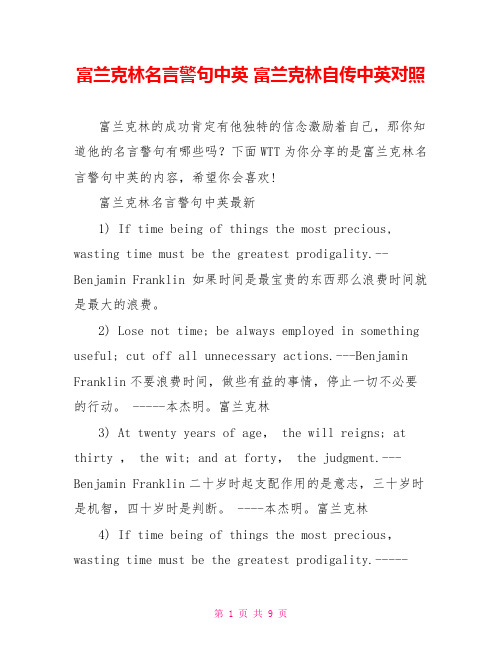
富兰克林名言警句中英富兰克林自传中英对照富兰克林的成功肯定有他独特的信念激励着自己,那你知道他的名言警句有哪些吗?下面WTT为你分享的是富兰克林名言警句中英的内容,希望你会喜欢!富兰克林名言警句中英最新1) If time being of things the most precious, wasting time must be the greatest prodigality.--Benjamin Franklin 如果时间是最宝贵的东西那么浪费时间就是最大的浪费。
2) Lose not time; be always employed in something useful; cut off all unnecessary actions.---Benjamin Franklin不要浪费时间,做些有益的事情,停止一切不必要的行动。
-----本杰明。
富兰克林3) At twenty years of age, the will reigns; at thirty , the wit; and at forty, the judgment.---Benjamin Franklin二十岁时起支配作用的是意志,三十岁时是机智,四十岁时是判断。
----本杰明。
富兰克林4) If time being of things the most precious,wasting time must be the greatest prodigality.-----Benjamin Franklin 如果时间是最宝贵的东西,那么浪费时间就是最大的浪费。
----本杰明。
富兰克林5) Sell not virtue to purchase wealth, norliberty to purchase power.-----Benjamin Franklin 不要出卖美德换取财富,也不要用自由交换权力。
-------本杰明。
本杰明富兰克林的名言英文

本杰明富兰克林的名言英文本杰明·富兰克林是美国的政治家、发明家、科学家和作家,他留下了许多经典的名言。
以下是一些本杰明·富兰克林的著名名言的英文版本:1."Tell me and I forget. Teach me and I remember. Involve me and I learn."2."Well done is better than well said."3."An investment in knowledge pays the best interest."4."Either write something worth reading or do something worth writing."5."By failing to prepare, you are preparing to fail."6."Early to bed and early to rise makes a man healthy, wealthy, and wise."7."Tell me who your friends are, and I will tell you who you are."8."In this world, nothing can be said to be certain, except death and taxes."9."Diligence is the mother of good luck."10."Guests, like fish, begin to smell after three days."这些名言涵盖了富兰克林在生活、学识、人际关系等方面的智慧和见解。
富兰克林名言名句
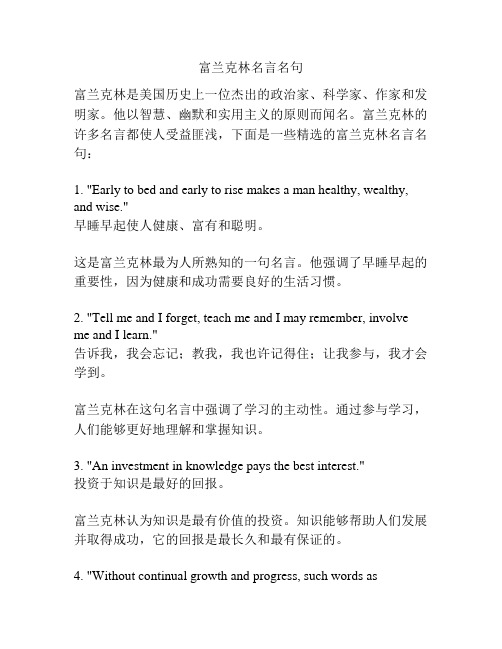
富兰克林名言名句富兰克林是美国历史上一位杰出的政治家、科学家、作家和发明家。
他以智慧、幽默和实用主义的原则而闻名。
富兰克林的许多名言都使人受益匪浅,下面是一些精选的富兰克林名言名句:1. "Early to bed and early to rise makes a man healthy, wealthy, and wise."早睡早起使人健康、富有和聪明。
这是富兰克林最为人所熟知的一句名言。
他强调了早睡早起的重要性,因为健康和成功需要良好的生活习惯。
2. "Tell me and I forget, teach me and I may remember, involve me and I learn."告诉我,我会忘记;教我,我也许记得住;让我参与,我才会学到。
富兰克林在这句名言中强调了学习的主动性。
通过参与学习,人们能够更好地理解和掌握知识。
3. "An investment in knowledge pays the best interest."投资于知识是最好的回报。
富兰克林认为知识是最有价值的投资。
知识能够帮助人们发展并取得成功,它的回报是最长久和最有保证的。
4. "Without continual growth and progress, such words asimprovement, achievement, and success have no meaning."没有持续的成长和进步,改善、成就和成功这样的词就毫无意义。
富兰克林强调了个人和社会的持续发展的重要性。
只有不断进步,我们才能取得改善、成就和成功。
5. "Well done is better than well said."做得好比说得好。
富兰克林强调了行动的重要性。
他认为人们应该用实际行动来证明自己的能力和价值,而不仅仅停留在口头表达上。
用英文作文介绍富兰克林
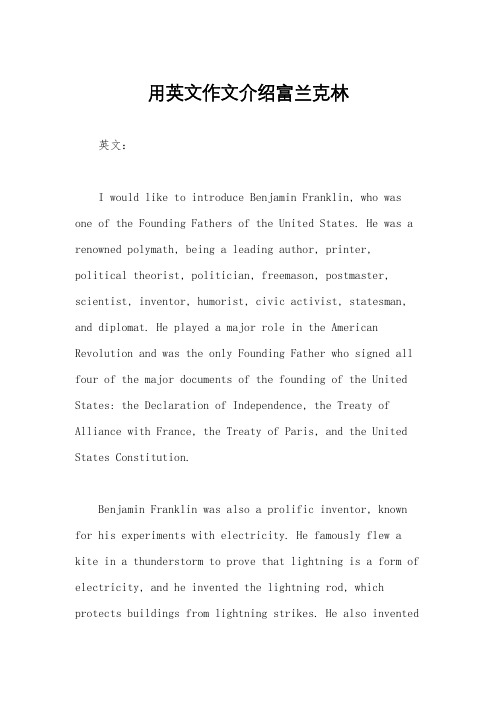
用英文作文介绍富兰克林英文:I would like to introduce Benjamin Franklin, who was one of the Founding Fathers of the United States. He was a renowned polymath, being a leading author, printer,political theorist, politician, freemason, postmaster, scientist, inventor, humorist, civic activist, statesman, and diplomat. He played a major role in the American Revolution and was the only Founding Father who signed all four of the major documents of the founding of the United States: the Declaration of Independence, the Treaty of Alliance with France, the Treaty of Paris, and the United States Constitution.Benjamin Franklin was also a prolific inventor, known for his experiments with electricity. He famously flew a kite in a thunderstorm to prove that lightning is a form of electricity, and he invented the lightning rod, which protects buildings from lightning strikes. He also inventedthe Franklin stove, bifocals, and the glass harmonica. His inventions and scientific discoveries have had a lasting impact on the world.In addition to his scientific and political achievements, Franklin was also a successful businessmanand philanthropist. He founded the first public library in America and the first fire department in Pennsylvania. He also played a key role in the establishment of theUniversity of Pennsylvania.中文:我要介绍的是本杰明·富兰克林,他是美国的开国元勋之一。
富兰克林名言
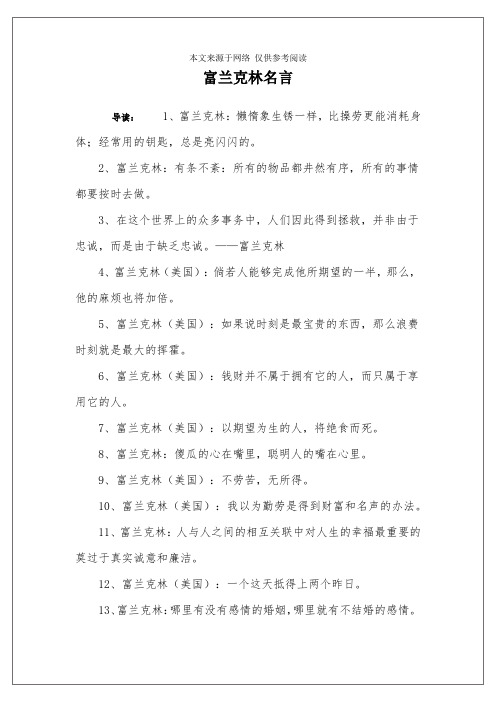
富兰克林名言导读:1、富兰克林:懒惰象生锈一样,比操劳更能消耗身体;经常用的钥匙,总是亮闪闪的。
2、富兰克林:有条不紊:所有的物品都井然有序,所有的事情都要按时去做。
3、在这个世界上的众多事务中,人们因此得到拯救,并非由于忠诚,而是由于缺乏忠诚。
——富兰克林4、富兰克林(美国):倘若人能够完成他所期望的一半,那么,他的麻烦也将加倍。
5、富兰克林(美国):如果说时刻是最宝贵的东西,那么浪费时刻就是最大的挥霍。
6、富兰克林(美国):钱财并不属于拥有它的人,而只属于享用它的人。
7、富兰克林(美国):以期望为生的人,将绝食而死。
8、富兰克林:傻瓜的心在嘴里,聪明人的嘴在心里。
9、富兰克林(美国):不劳苦,无所得。
10、富兰克林(美国):我以为勤劳是得到财富和名声的办法。
11、富兰克林:人与人之间的相互关联中对人生的幸福最重要的莫过于真实诚意和廉洁。
12、富兰克林(美国):一个这天抵得上两个昨日。
13、富兰克林:哪里有没有感情的婚姻,哪里就有不结婚的感情。
14、我们在享受着他人的发明给我们带来的巨大益处,我们也务必乐于用自我的发明去为他人服务。
——富兰克林15、富兰克林:把自我的缺点告诉你的朋友是莫大的信任,把他的缺点告诉他是更大的信任。
16、富兰克林(美国):从事一项事情,先要决定志向,志向决定之后就要全力以赴毫不犹豫地去实行。
17、思考应当走到众人前面去,愿望不妨留在后面。
——富兰克林18、富兰克林(美国):要强迫自我工作,不好等到工作来强迫你。
摘自:短美文19、(美)富兰克林:读书是易事,思索是难事,但两者缺一,便全无用处。
20、富兰克林(美国):信奉真理的人,必受天佑。
21、富兰克林(美国):把别人对你的诋毁放在尘土中;而把别人对你的恩惠刻在大理石上。
22、能忍耐的人才能到达他所期望到达的目的。
——富兰克林23、富兰克林(美国):真话说一半常常是弥天大谎。
24、富兰克林(美国):期望是永远达不到的,因此,人才期望,追求期望。
富兰克林格言 英文
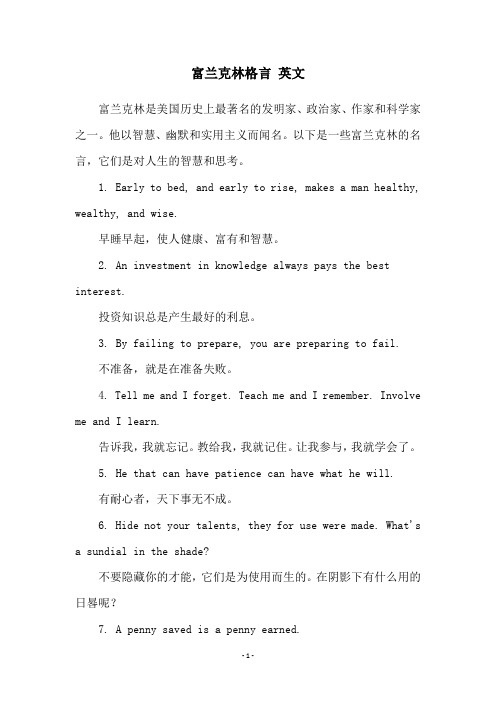
富兰克林格言英文富兰克林是美国历史上最著名的发明家、政治家、作家和科学家之一。
他以智慧、幽默和实用主义而闻名。
以下是一些富兰克林的名言,它们是对人生的智慧和思考。
1. Early to bed, and early to rise, makes a man healthy, wealthy, and wise.早睡早起,使人健康、富有和智慧。
2. An investment in knowledge always pays the best interest.投资知识总是产生最好的利息。
3. By failing to prepare, you are preparing to fail.不准备,就是在准备失败。
4. Tell me and I forget. Teach me and I remember. Involve me and I learn.告诉我,我就忘记。
教给我,我就记住。
让我参与,我就学会了。
5. He that can have patience can have what he will.有耐心者,天下事无不成。
6. Hide not your talents, they for use were made. What'sa sundial in the shade?不要隐藏你的才能,它们是为使用而生的。
在阴影下有什么用的日晷呢?7. A penny saved is a penny earned.省一分钱,就是赚一分钱。
8. An ounce of prevention is worth a pound of cure.预防胜于治疗。
9. Remember not only to say the right thing in the right place, but far more difficult still, to leave unsaid the wrong thing at the tempting moment.记住不仅要在正确的地方说正确的话,更难的是在诱人犯罪的时刻不说错误的话。
本杰明·富兰克林的名言名句

本杰明·富兰克林(Benjamin Franklin)(1706—1790年)是18世纪美国的实业家、科学家、社会活动家、思想家和外交家。
他是美国历史上第一位享有国声誉的科学家和发明家和音乐家。
为了对电进行探索曾经作过著名的“风筝实验”,在电学上成就显著,为了深入探讨电运动的规律,创造的许多专用名词如正电、负电、导电体、电池、充电、放电等成为世界通用的词汇。
他借用了数学上正负的概念,第一个科学地用正电、负电概念表示电荷性质。
并提出了电荷不能创生、也不能消灭的思想,后人在此基础上发现了电荷守恒定律。
他最先提出了避雷针的设想,由此而制造的避雷针,避免了雷击灾难,破除了迷信。
他是一位优秀的政治家,是美国独立战争的老战士。
他参加起草了《独立宣言》和美国宪法,积极主张废除奴隶制度,深受美国人民的崇敬。
他是美国第一位驻外大使(法国),所以在世界上也享有较高的声誉。
★ 钱财并不属于拥有它的人,而只属于享用它的人。
---富兰克林(美国)★ 挥霍无度的人,等于将自己的前途抵押了出去。
---富兰克林(美国)★ 须要注意小额费用。
一艘大船的沉没,有时是微的裂口所致。
---富兰克林(美国)★ 把钱用在对自己对别人都有益的事情上,不要错花一分钱。
---富兰克林(美国)★ 如果你懂得量入为出,那你就可以致富了。
---富兰克林(美国)★ 失足可以很快弥补,失言却可能永远无法补救。
---富兰克林(美国)★ 傻瓜的心在嘴里,聪明人的嘴在心里。
---富兰克林(美国)★ 骄傲者憎恨他人骄傲。
---富兰克林(美国)中华励志网★ 最难抑制的情感是骄傲,尽管你设法掩饰,竭力与之斗争,它仍然存在。
即使我敢相信已将它完全克服,我很可能又因自己的谦逊而感到骄傲。
---富兰克林(美国)★缺少谦虚就是缺少见识。
---富兰克林(美国)★ 虚荣是骄傲的食物,轻蔑是它的饮料。
---富兰克林(美国)★ 没有任何动物比蚂蚁更勤奋,然而它却最沉默寡言。
富兰克林名言 英语

富兰克林名言英语1、倾囊求知,无人能夺。
投资知识,得益最多。
No one can seize knowledge without sacrificing it. Investing in knowledge will benefit the most.2、倾已所有追求知识,没有人能夺走它;向知识投资,收益最佳。
No one can take away all the knowledge that has been pursued; the best return is to invest in knowledge.3、读书是我惟一的娱乐,我不把时间浪费于酒店、赌博或任何一种恶劣的游戏。
Reading is my only entertainment. I don't waste my time in hotels, gambling or any other bad game.4、不谦虚的话只能有这个辩解,即缺少谦虚就是缺少见识。
Unmodest words can only have this excuse, that is, lack of modesty is lack of insight.5、二十岁时支配作用的是意志,三十岁时是机智,四十岁时是判断。
At the age of 20, will dominates, at the age of 30, wit, and at the age of 40, judgment.6、诚实和勤勉应该成为你永久的伴侣。
Honesty and diligence should be your permanent panion.7、我从不到酒馆、赌场或任何其他娱乐场所去消磨时光。
I never spend time in pubs, casinos or any other entertainment.8、闲暇是为了做出某种有益的事而有的时间。
富兰克林名言名句

富兰克林名言名句英文回答:I'm Benjamin Franklin, one of the Founding Fathers of the United States. I'm also known for my wit and wisdom, and I've been quoted many times over the years. Here are a few of my favorite quotes:"Early to bed and early to rise, makes a man healthy, wealthy, and wise." This is a proverb that I learned when I was a young boy, and it's one that I've always tried tolive by. I believe that getting a good night's sleep is essential for both our physical and mental health. Whenwe're well-rested, we're more productive, we make better decisions, and we're less likely to get sick. As for the "wealthy" and "wise" parts of the proverb, I believe that they come naturally when we live a balanced life, one that includes hard work, dedication, and a love of learning."A penny saved is a penny earned." This is anotherproverb that I've always found to be true. I believe that saving money is one of the most important things we can do for our future. When we save money, we're not only puttingit aside for a rainy day, we're also investing in ourselves. By saving money, we can afford to buy the things we needand want, and we can also give ourselves a sense of security."Honesty is the best policy." This is a quote thatI've always believed in. I believe that honesty is the foundation of all good relationships, both personal and professional. When we're honest with others, we build trust and respect. We also show that we value their opinions and their time."If you fail to plan, you are planning to fail." Thisis a quote that I've found to be true in all aspects of my life. I believe that planning is essential for success. When we plan, we take the time to think about what we wantto achieve and how we're going to get there. This helps usto stay focused and motivated, and it also helps us toavoid making costly mistakes."Time is money." This is a quote that I've always taken to heart. I believe that time is our most valuable asset, and we should use it wisely. When we waste time,we're not only wasting our own time, we're also wasting the time of others.These are just a few of my favorite quotes. I hope you find them as inspiring as I do.中文回答:大家好,我是本杰明·富兰克林,美利坚合众国国父之一。
- 1、下载文档前请自行甄别文档内容的完整性,平台不提供额外的编辑、内容补充、找答案等附加服务。
- 2、"仅部分预览"的文档,不可在线预览部分如存在完整性等问题,可反馈申请退款(可完整预览的文档不适用该条件!)。
- 3、如文档侵犯您的权益,请联系客服反馈,我们会尽快为您处理(人工客服工作时间:9:00-18:30)。
简介Benjamin Franklin was born in Milk Street, Boston, on January 6, 1706. His father, Josiah Franklin, was a tallow chandler who married twice, and of his seventeen children Benjamin was the youngest son. His schooling ended at ten, and at twelve he was bound apprentice学徒 to his brother James, a printer, who published the "New England Courant."To this journal he became a contributor, and later was for a time its nominal editor. But the brothers quarreled, and Benjamin ran away, going first to New York, and thence to Philadelphia, where he arrived in October, 1723. He soon obtained work as a printer, but after a few months he was induced by Governor Keith to go to London, where, finding Keith's promises empty, heworked as a compositor again till he was brought back to Philadelphia by a merchant named Denman, who gave him a position inhis business. On Denman's death he returned to his former trade, and shortly set up a printing house of his own from which he published "The Pennsylvania Gazette," to which he contributed many essays, and which he made a medium for agitating a variety of local reforms.In 1732 he began to issue his famous "Poor Richard's Almanac"《穷理查德年鉴》,for the enrichment浓缩 of which he borrowed or composed整理 those pithy精辟的utterances言论 of worldly wisdom which are the basis of a large part of his popular reputation. In 1758, the year in which he ceases停止 writing for the Almanac, he printed in it "Father Abraham's Sermon," now regarded as the most famous piece文章 of literature produced in Colonial America. Meantime Franklin was concerning himself more and more with public affairs. He set forth a scheme for an Academy, which was taken up later and finally developed into the University of Pennsylvania; and he founded an "American Philosophical Society" for the purpose of enabling scientific men to communicate their discoveries to one another. He himself had already begun his electrical researches, which, with other scientific inquiries, he called on in the intervals of money-making and politics to the end of his life. In 1748 he sold his business in order to get leisure for study, having now acquired comparative wealth; and in a few years he had made discoveries that gave him a reputation with the learned throughout Europe.Benjamin Franklin (January 17, 1706–April 17, 1790) was one of the Founding Fathers of the United States. A noted polymath, Franklin was a leading author and printer, political theorist, politician, postmaster,scientist, inventor, satirist, civic activist, statesman, and diplomat. As a scientist, he was a major figure in the American Enlightenment and the history of physics for his discoveries and theories regarding electricity. He invented the lightning rod, bifocals, the Franklin stove, a carriage odometer, and the glass 'armonica'. He formed both the first public lending library in America and the first fire department in Pennsylvania.Franklin earned the title of "The First American" for his early and indefatigable campaigning for colonial unity; as an author and spokesman in London for several colonies, then as the first United States Ambassador to France, he exemplified the emerging American nation.[2] Franklin was foundational in defining the American ethos as a marriage of the practical and democratic values of thrift, hard work, education, community spirit, self-governing institutions, and opposition to authoritarianism both political and religious, with the scientific and tolerant values of the Enlightenment. In the words of historian Henry Steele Commager, "In a Franklin could be merged the virtues of Puritanism without its defects, the illumination of the Enlightenment without its heat."[3] To Walter Isaacson, this makes Franklin "the most accomplished American of his age and the most influential in inventing the type of society America would become."[4]Franklin, always proud of his working class roots, became a successful newspaper editor and printer in Philadelphia, the leading city in the colonies. He was also partners with William Goddard and Joseph Galloway the three of whom published the Pennsylvania Chronicle, a newspaper that was known for its revolutionary sentiments and criticisms of the British monarchy in the American colonies.[5] He became wealthy publishing Poor Richard's Almanack and The Pennsylvania Gazette. Franklin gained international renown as a scientist for his famous experiments in electricity and for his many inventions, especially the lightning rod. He played a major role in establishing the University of Pennsylvania and was elected the first president of the American Philosophical Society. Franklin became a national hero in America when he spearheaded the effort to have Parliament repeal the unpopular Stamp Act. An accomplished diplomat, he was widely admired among the French as American minister to Paris and was a major figure in the development of positiveFranco-American relations. For many years he was the British postmaster for the colonies, which enabled him to set up the first national communications network. He was active in community affairs, colonial and state politics, as well as national and international affairs. From 1785 to 1788, he served as governor of Pennsylvania. Toward the end of his life, he freed his slaves and became one of the most prominent abolitionists.His colorful life and legacy of scientific and political achievement, and status as one of America's most influential Founding Fathers, have seen Franklin honored on coinage and money; warships; the names of many towns, counties, educational institutions, namesakes, and companies; and more than two centuries after his death, countless cultural references.名言Silence is not always a sign of wisdom, but babbling is ever a folly. --Benjamin Franklin沉默并不是智慧的标志,但唠叨永远是一项蠢行。
